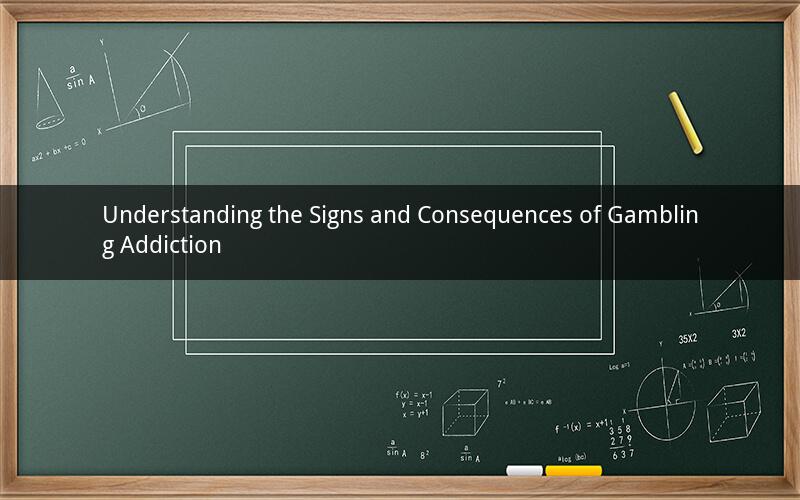
Gambling addiction, also known as compulsive gambling, is a serious condition that affects millions of people worldwide. It is characterized by an inability to control or stop gambling, despite negative consequences in various aspects of life. In this article, we will delve into the signs of gambling addiction, its consequences, and how to seek help for those struggling with this problem.
1. Signs of Gambling Addiction
a. Preoccupation with gambling: Individuals with gambling addiction often think about gambling constantly, planning their next betting session, or reliving past gambling experiences.
b. Inability to control gambling: Despite the desire to stop or limit gambling, individuals with addiction find it difficult to control their urge to gamble.
c. Increased risk of financial problems: Gambling addiction can lead to significant financial losses, as individuals may borrow money, sell personal belongings, or even commit fraud to fund their gambling habits.
d. Relationship problems: The stress and financial strain caused by gambling addiction can strain relationships with family, friends, and partners.
e. Legal issues: Compulsive gamblers may face legal consequences due to their gambling activities, such as theft, fraud, or embezzlement.
f. Withdrawal symptoms: When individuals with gambling addiction try to stop or reduce their gambling, they may experience withdrawal symptoms like irritability, anxiety, and depression.
2. Consequences of Gambling Addiction
a. Financial: The most immediate and apparent consequence of gambling addiction is the financial burden it places on individuals and their families. This can lead to bankruptcy, eviction, and other financial hardships.
b. Emotional: Gambling addiction can cause severe emotional distress, including anxiety, depression, and feelings of guilt or shame.
c. Physical: Chronic stress and financial strain can lead to physical health problems, such as heart disease, hypertension, and insomnia.
d. Social: The strain caused by gambling addiction can lead to social isolation, as individuals may avoid family and friends or lose their jobs due to their gambling habits.
e. Legal: As mentioned earlier, gambling addiction can lead to legal issues, which can further worsen an individual's situation.
f. Psychological: In some cases, gambling addiction can lead to psychological disorders, such as bipolar disorder or personality disorders.
3. Seeking Help for Gambling Addiction
a. Therapy: Cognitive-behavioral therapy (CBT) is an effective treatment for gambling addiction. It helps individuals recognize and change their gambling-related thoughts and behaviors.
b. Support groups: Joining a support group, such as Gamblers Anonymous, can provide individuals with a sense of community and support from others who are struggling with similar issues.
c. Medication: In some cases, medication may be prescribed to help manage symptoms of anxiety or depression associated with gambling addiction.
d. Financial counseling: A financial counselor can help individuals manage their debts and develop a budget to recover from the financial consequences of gambling addiction.
e. Family therapy: Family therapy can help improve communication and rebuild relationships strained by gambling addiction.
f. Legal assistance: If legal issues have arisen due to gambling addiction, seeking legal assistance can help individuals navigate the legal system and mitigate potential consequences.
Frequently Asked Questions:
1. What is the difference between problem gambling and gambling addiction?
Answer: Problem gambling refers to any gambling behavior that disrupts an individual's life, while gambling addiction is a severe form of problem gambling characterized by an inability to control gambling and its negative consequences.
2. Can gambling addiction be cured?
Answer: While there is no cure for gambling addiction, it can be effectively managed with proper treatment and support.
3. How common is gambling addiction?
Answer: It is estimated that between 2% and 3% of the adult population in the United States has a gambling addiction.
4. Can gambling addiction be inherited?
Answer: While genetics may play a role in the development of gambling addiction, it is not considered a purely genetic disorder.
5. Is there a specific age group more prone to gambling addiction?
Answer: Individuals between the ages of 18 and 35 are more likely to develop gambling addiction, but it can affect people of all ages.